Luz Rello stresses the importance of resilience and perseverance at the inauguration of the UPF 2021-2022 academic year
Luz Rello stresses the importance of resilience and perseverance at the inauguration of the UPF 2021-2022 academic year
Luz Rello stresses the importance of resilience and perseverance at the inauguration of the UPF 2021-2022 academic year
The PhD with the University’s Department of Information and Communication Technologies and expert in the application of artificial intelligence for dyslexia gave the lecture “The value of mistakes, in research and in life”. The ceremony, which took place on 18 October in the auditorium of the Poblenou campus, included speeches by Oriol Amat, UPF rector; Gemma Geis, minister for Research and Universities, and Montserrat Vendrell, chair of the UPF Board of Trustees.
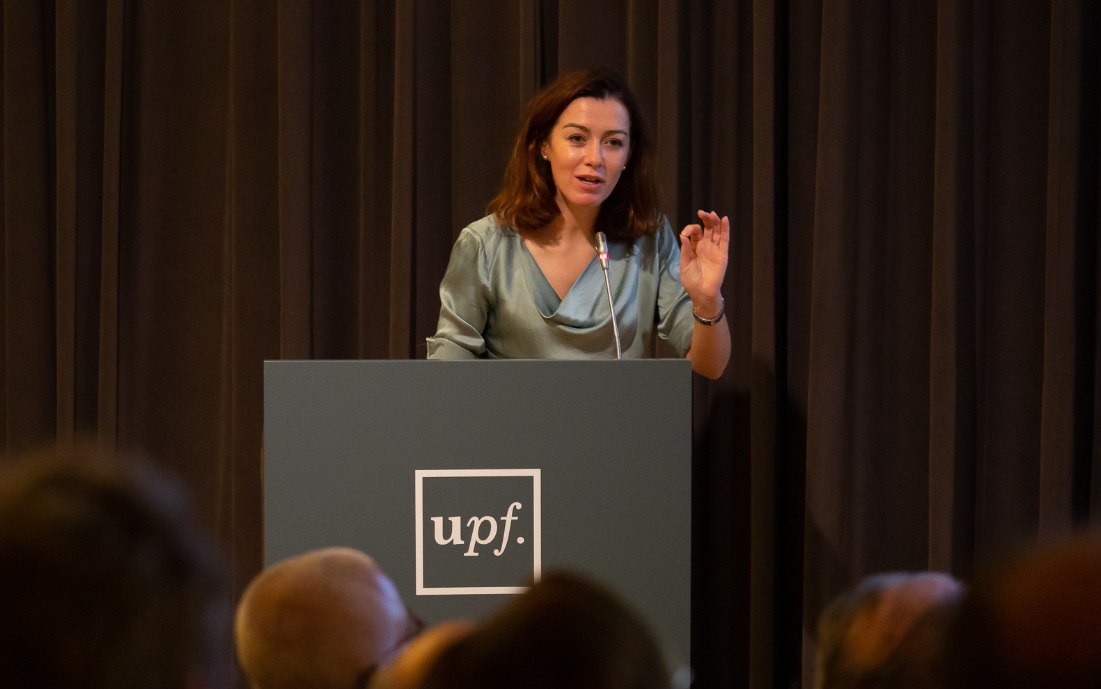
Luz Rello, a PhD in Computer Science from the UPF Department of Information and Communication Technologies (DTIC) and expert in the application of artificial intelligence for dyslexia gave the lecture “The value of mistakes, in research and in life”, thus opening the 2021-2022 academic year at Pompeu Fabra University.
The opening ceremony took place on 18 October, at noon, in the auditorium of the Poblenou campus, and was presided over by Oriol Amat, rector of the University. He was accompanied at the presiding table by Gemma Geis, minister for Research and Universities; Montserrat Vendrell, chair of the UPF Board of Trustees, and Pere Torra, University general secretary.
Other authorities and officials present at the event included Esther Morales, secretary general for Research and Universities; Josep Ribas, secretary general of the Interuniversity Council of Catalonia (CIC); Xavier Aldeguer, director general for Knowledge Transfer of the ministry for Research and Universities, and Jaume Casals and Enric Argullol, former UPF rectors.
Oriol Amat offered a few words of welcome, which were followed by the screening of the videoreport of the 2020-2021 academic year at UPF, a review of the main milestones achieved by the University during this period. In the year in which the centenary of Albert Einstein’s Nobel Prize is being commemorated, UPF wished to acknowledge the importance of scientific knowledge and the people who work in the field.
Thus, he dedicated each of the eight blocks that comprise the videoreport to a distinguished scientist: Community (Marie Curie, physicist and chemist); Teaching (Lise Meitner, physicist); Research (Josefina Castellví, biologist and oceanographer); Internationalization (María Zambrano, philosopher); Environment and outreach (Hannah Arendt, political scientist); Funding and campus (Beatrice Webb, economist), and Social Engagement (Dorothy Crowfoot, chemist).
>Videoreport of the 2020-2021 academic year
Then, Oriol Amat introduced the speaker of the inaugural lesson, Luz Rello, a PhD in Computational Science from the UPF Department of Information and Communication Technologies (DTIC), and an expert in the application of artificial intelligence for dyslexia. “You will have heard me stress on many occasions how necessary it is to increase the transfer of the knowledge we generate at UPF in order to ensure that it has a more positive impact on the well-being of society. Professor Rello is a good example of how to succeed in this task”, the rector asserted.
Inaugural lecture by Luz Rello
In her lecture, Luz Rello reviewed the milestones in her life and in her research career, from the problems that dyslexia caused her at school, from a very young age, and how she tried to overcome them, her twelve years of research in Spain and in the United States, with various discoveries related to mistakes, until the creation of the social company Change Dyslexia in 2015: this project has enabled more than 300,000 boys and girls to take the Dytective screening test, making it the most widely used online test in the world for detecting dyslexia.
> Video of the complete inaugural lecture
Excerpts from the lecture
“I am overjoyed. I never thought I would be here doing this, really. I never imagined this just as I never thought I’d finish school”
“From an early age, mistakes were something that annoyed me because they made me fail. I wanted to eliminate mistakes”
“In my time at UPF, the issue of mistakes resurfaced. The full professor of the DTIC, Ricardo Baeza-Yates, encouraged me to change the subject of my thesis and to use what I knew about computer science and linguistics to help people with dyslexia, like me”.
“At UPF we experimented in people with and without dyslexia, to see how they read texts on the screen with and without mistakes, and we saw that people with dyslexia processed texts with mistakes differently, and we detected some patterns”.
“At Carnegie Mellon University we saw that if we introduced these patterns into an artificial intelligence setting, we were able to predict and screen for the risk of dyslexia, after fifteen minutes of playing a game”.
“If we mixed this information with language patterns and stimulation and entertainment exercises, and we personalized it with the children’s strengths and weaknesses, they could improve significantly”.
“I thought that this research needed to be put at the service of people, so they could use it”
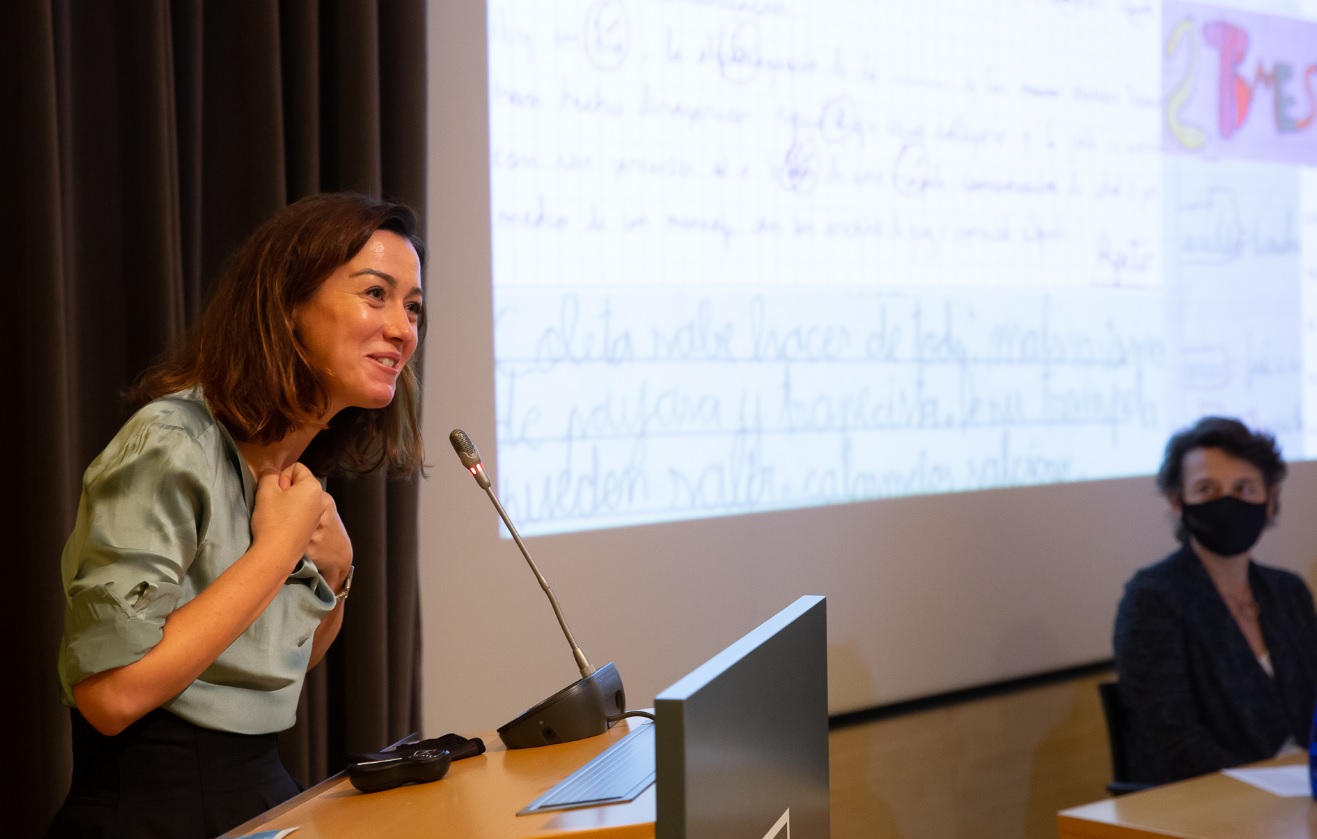
“Through a crowdfunding campaign we got seed capital, which allowed us to create “Change Dyslexia”, where we integrated all this research into the Dytective platform, which includes a screening test and more than 40,000 exercises”
“The business model created had to overcome three barriers of dyslexia: first, it was very difficult to detect (which is why we pushed for free text); second, the fact that dyslexia was related to poor performance at school (we created self-stimulation exercises); and third, socioeconomic barriers, as fighting dyslexia was expensive (we created scholarships for families who could not afford to pay for treatment).
“We did all this thanks to collaborations with companies and the public authorities: hundreds of schools in the Autonomous Community of Madrid have incorporated the Dytective platform”
“Since 2016 we have been taking steps to create the Dytective Cat platform, but it is a complicated task. All that remains is to implement the product”
“I would give advice to students just starting out: at the beginning you have to give it your all, it’s really hard (...) You need to keep going, no matter what others say or think about you, as they are worried about other things (…) You need to value the importance of resilience and perseverance; without them, there is no way to achieve anything ( ...) If you have a passion, follow it. In the end, people who follow their passion end up achieving something. But if your passion is still not defined, no problem (…) Do your best, fight for what you believe to be right (…) Even if you’re not quite sure what your dream is, you’re now in the right place. UPF is the right place and there are many brilliant researchers and professors who can help you”.
Speeches by the authorities
Then followed a series of speeches (in this order) given by Montserrat Vendrell, chair of the UPF Board of Trustees; Gemma Geis, minister for Research and Universities, and Oriol Amat, UPF rector.
Speech by Montserrat Vendrell
Excerpts from the speech:
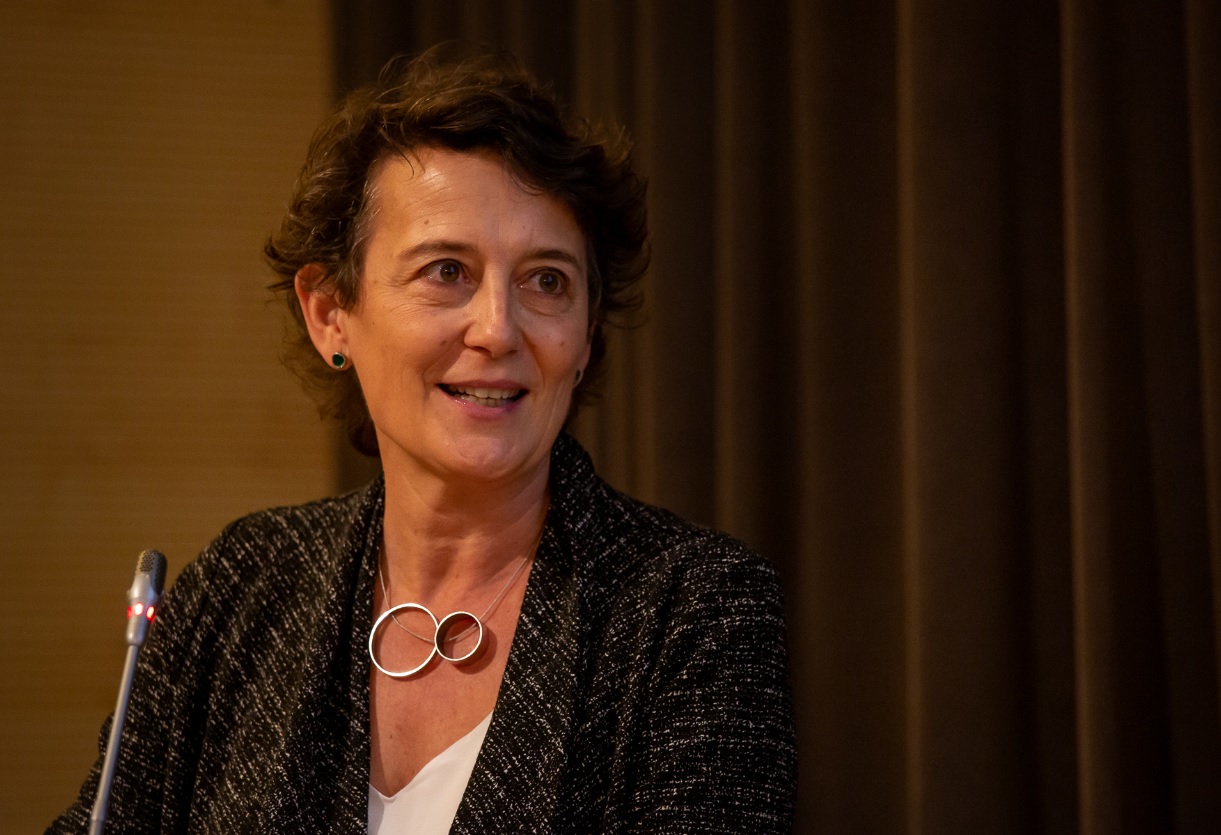
“We are starting a new academic year with a full auditorium and that’s great to see. We should note the effort of all UPF members to adapt to all the changes and to get back to normal. Thanks to all of you who have made this possible”
“The new governing team aims to implement the major strategic challenges for the growth and development of UPF, such as the Citadel of Knowledge, Planetary Wellbeing and EDvolution. I thank Oriol Amat for wanting to work together with the UPF Board of Trustees to implement a new style of governance in keeping with the needs of society”.
“I know that the minister is aware of the challenges we face, in terms of a research of excellence, quality education and innovation. We must seize the moment to emerge stronger from the crisis”
“The students must enjoy UPF and make the most of what the University has to offer. Be critical and be good ambassadors of UPF”
“Hopefully we are beginning a new period in which we can take advantage of all the lessons learned from this crisis”
Speech by Gemma Geis
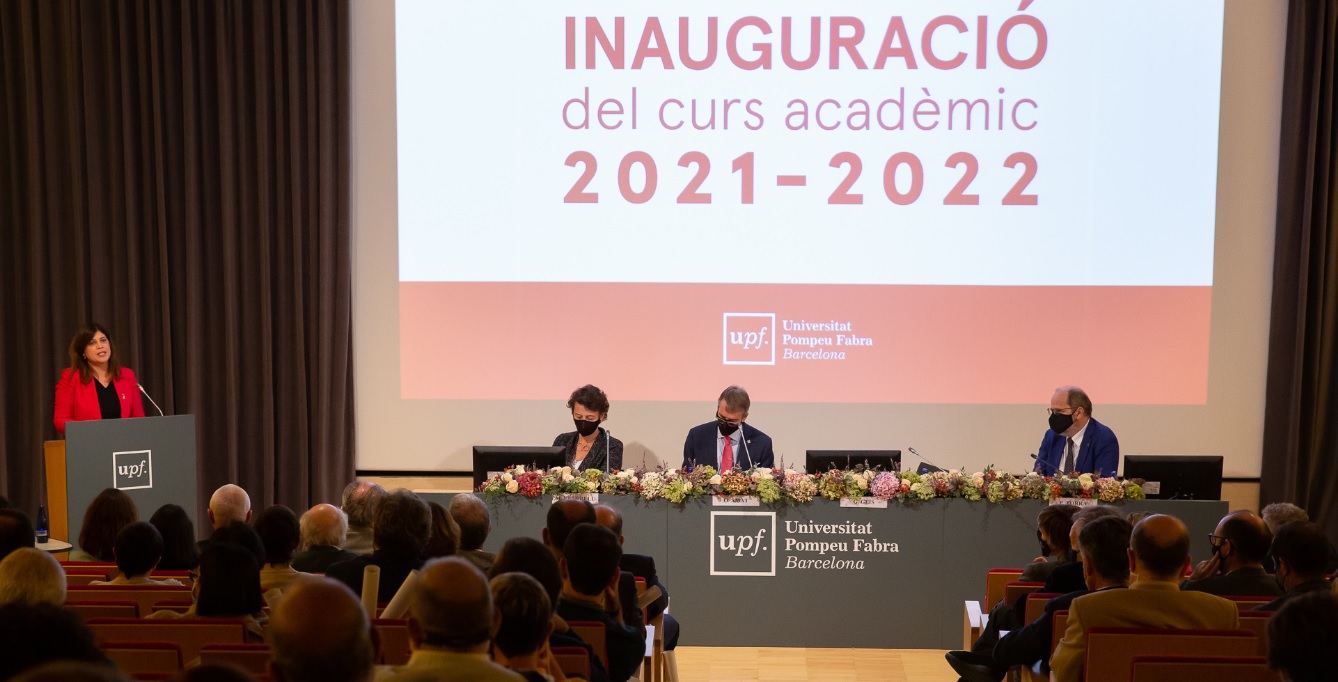
Excerpts from the speech
“In relation to the passion that Luz Rello was talking about in her lecture, one of the challenges of the ministry is the need for transfer: we must ensure that the country’s research reserves reach society, so that it can become fairer and freer, and yield benefits for the citizens. Knowledge transfer is one of the challenges we have as a country and a mission we have as a university”
“As minister for Research and Universities, I can say that rather than an office it’s an errand. Research is the best contingency plan we can make as a society for the country we aspire to. We are committed to the country’s research system”
“We need to improve the system of university funding and the country’s scientific and digital infrastructures”
“Increasing the budget for research and universities will be a reality. I hope that we politicians can provide the solvency that the country’s university system deserves”
“There are six areas of the country in which we must strive in research: the European chip and improved technological sovereignty; the use of artificial intelligence to improve people’s daily lives; research into health; cybersecurity; the new agriculture; and architecture and the town planning”
“We must take advantage of this window of opportunity to improve funding and budgets for universities and research and strengthen the Catalan system. We have an ecosystem of people and leadership that makes this possible, I think we can do it”
“We must make policies for and with young people. Their present and their future are not only theirs, it is also our country’s. You have an ally in our department”.
Speech by Oriol Amat
> Video with the complete speech
Excerpts from the speech
“There are four common characteristics that are shared by the best universities in the world: an international outlook; a commitment to research and to being a research-intensive university; a commitment to excellence in their other activities: teaching and knowledge transfer, and finally, they are well-funded universities”
“We are quite confident in the minister and her team, not only as regards the budget and its substantial improvement, but also concerning the initiatives that are being carried out, such as the directorate-general for knowledge transfer. They are going in the right direction regarding how to steer and promote a good university system”
“When we look at the top ten universities in front of and behind us the Times Higher Education ranking, where we are 156th in the world, we see that they have two, three and four times the funding we receive for any of the items they include”
“We have to see if the variable part of the funding can be increased, the part that takes performance into account”
“I am convinced not only that the world is changing very fast; I would add that I believe that the world is changing faster than our universities, and that means that we have a problem that concerns the university system but also organizations, companies, social and business fabric”
“UPF has a project that has meant that its various rectors have passed on the baton on issues that were already on the agenda 30 years ago. We have a shared system of governance, which the various governing teams are continuing, a programme of continuity”
“There are seven topics in which we will try to step on the accelerator: continue promoting research; the knowledge we generate is pending having an impact on society, on teaching and on knowledge transfer (…) Obtain greater resources, interacting with the society to which we are indebted (…) The new teaching model EDvolution: we are doing pilot tests, this will be an experimental year, but next year we will implement it; we believe that it is the model that society and our students need (…) Improve the presence of English and Catalan in teaching and publications (…) Expand the presence of culture and the humanities: we want the weight of culture and the humanities to reach all UPF bodies and activities (…) Finally, further social responsibility, gender equality and sustainability (…)”
“The first stage of this plan to transform UPF lasts ninety days and we are looking forward to seeing significant changes in several areas soon”
“In January, if the 90-day experiment goes well, we will set up 50 rapid-response teams to make tangible transformations, to catch up with society, which is going faster than us”
My campaign motto was “A better university for all”, but to make this possible, I need everyone’s involvement: the government, the university system, organizations around UPF, and all the University bodies”.
Upon concluding his speech, the rector, Oriol Amat, declared the UPF 2021-2022 academic year open. The performance of the popular university anthem Gaudeamus igitur brought an end to the ceremony.
Using research into artificial intelligence to improve dyslexia
Luz Rello Sánchez (Madrid, 1984) holds a bachelor’s degree in Linguistics from the Complutense University of Madrid (2008), a master’s degree in Natural Language Processing and Human Language Technology from the UAB and the University of Wolverhampton (2010), and earned her PhD in Computational Science from the UPF Department of Information and Communication Technologies, with her thesis “DysWebxia: a text accessibility model for people with dyslexia” (2014), supervised by professors Ricardo Baeza Yates and Horacio Saggion.
In 2015 she founded the social company Change Dyslexia, in which she integrated the results of her research into the Dytective computer platform, which has become the most used platform for dyslexia in Spanish
Her research, which focuses on applying artificial intelligence (AI) for dyslexia, has received several awards such as the European Young Researchers’ Award (2013), granted by the Euroscience association; the Princess of Girona Foundation Award (2016), and the Innovators Under 35, convened by the MIT Technology Review (2020).
In 2015 she founded the social company Change Dyslexia, in which she integrated the results of her research into the Dytective computer platform, which has become the most used platform for dyslexia in Spanish: 300,000 people, implemented in hundreds of public schools in Spain. In 2020, this application received the UNESCO King Hamad Bin Isa Al-Khalifa Award for the use of AI in education, and was the first Spanish institution to receive this recognition.
Luz Rello is currently a lecturer with the Department of Information Systems and Technology at the IE Business School and she has published two books, one of them with Planeta, Overcoming Dyslexia, which is already in its fourth edition.
The inaugural poster for the 2021-2022 academic year, the work of the Indian artist Nalini Malani
The inaugural poster for the 2021-2022 academic year is the work of the artist Nalini Malani, currently residing in Mumbai (India), who has dedicated her artistic career to upholding social, feminist and ecological justice. Her work is constructed as a narrative that intertwines Asian and Western literary references, mythologies, and aesthetic forms to create an unmistakable, highly complex language.
In the inaugural poster, the Indian artist incorporates a haiku (a kind of Japanese poetry characterized by its brevity), the work of the poet Matsuo Bashō:
From time to time
From time to time
The clouds give rest
To the moon beholders.
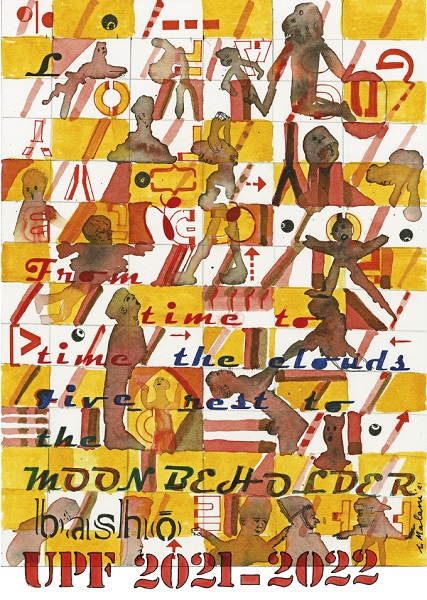 Nalini Malani was born in Karachi (present-day Pakistan) in 1946, a year before the partition of India and Pakistan. Her family went into exile in Kolkata in 1947, and later moved to Mumbai in 1954. The personal and collective upheaval of the partition of India, her early experience of displacement and her refugee status have marked her biography and artistic production, which has developed, in her words, as an attempt to “give meaning to the feelings of loss, exile, and nostalgia” that tarnished her childhood.
Nalini Malani was born in Karachi (present-day Pakistan) in 1946, a year before the partition of India and Pakistan. Her family went into exile in Kolkata in 1947, and later moved to Mumbai in 1954. The personal and collective upheaval of the partition of India, her early experience of displacement and her refugee status have marked her biography and artistic production, which has developed, in her words, as an attempt to “give meaning to the feelings of loss, exile, and nostalgia” that tarnished her childhood.
Between 1964 and 1969 she studied Fine Arts at the Sir Jamsetjee Jeejeebhoy School of Art in Mumbai, where she established her studies at the Bhulabhai Memorial Institute in Mumbai. Shortly after graduating, Malani worked in film and photography. Between 1970 and 1972, she received a scholarship from the French government to study arts in Paris, where she came into contact with the theories of Louis Althusser, Roland Barthes and Noam Chomsky.
Nalini Malani’s work has been presented at several international museums, such as the Stedelijk Museum, the MoMA Museum of Modern Art, and the Joan Miró Foundation.
In 1973, Malani returned to India determined to contribute to the intellectual modernization and emancipation of her country through art. Gradually, the artist emerged as a pioneering figure in Indian experimental film. In her role as a curator, Malani organized the first collective exhibition of Indian artists in 1985 in Delhi.
Nalini Malani’s work has been presented at several international museums, such as the Stedelijk Museum, the MoMA Museum of Modern Art, and the Joan Miró Foundation. In 2010, the work earned her the Joan Miró Award, granted jointly by the Joan Miró Foundation and the “la Caixa” Foundation. Previously, she received the Fukuoka Prize for Arts & Culture, the St. Moritz Art Masters Lifetime Achievement Award, and the Asia Art Game Changers Award, among others.
The defence of the vulnerable, a constant in her work
Malani’s work addresses the recent history of the Indian subcontinent and delves into urgent and universal issues such as violence, war, fundamentalism, the oppression of women, the effects of globalization and the destruction of the environment. Throughout her artistic production, Nalini Malani defends vulnerable people, especially women, by tirelessly giving them a voice. Her works evoke this vulnerability of human existence based on Greek and Indian myths that form part of her personal iconography.
Malani’s works have also been influenced by literature and her readings of philosophers, poets, psychologists, writers, and artists. Literary quotations are a constant in her creation. Her works are characterized by the extension of the pictorial surface to the surrounding space and culminate in a visual narration in layers that take the form of ephemeral drawings on the walls, shadow play, installations, projected works and the scenic arts.
Nalini Malani Wikiproject
The Nalini Malani Wikiproject aims to expand the thinking of the Indian artist through the creation or improvement of articles related to her exhibition You don’t hear me, which the Joan Miró Foundation hosted from June to November 2020, a selection of works from her entire artistic career, marked by feminist thought and the denunciation and condemnation of violence.
This Wikiproject, with the collaboration of Friendly Wikimedia and UPF Wikiwomen and Wikiwomen, reviews the names of the authors who have accompanied her throughout her career and also the universal myths that have marked her, with the aim of completing them on Wikipedia. The effort seeks to raise awareness of these women much as Nalini Malani, in the title of her exhibition at the Joan Miró Foundation, gives visibility to silenced women and confronts the patriarchy directly by telling it You don’t hear me.
